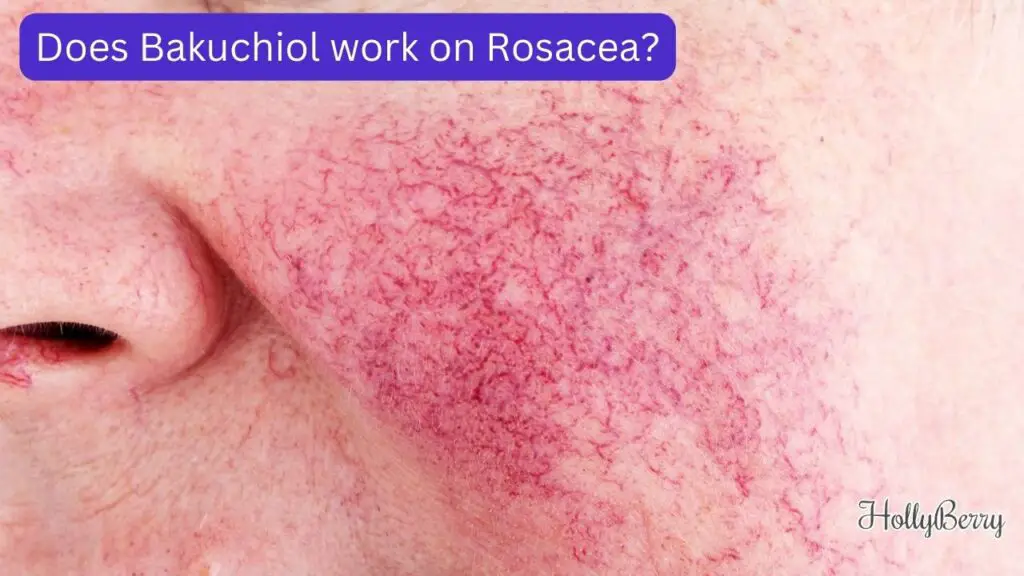
Bakuchiol, a plant-based alternative to retinoids, has been gaining attention in recent years for its potential benefits in skincare. Some studies suggest that bakuchiol may help improve the symptoms of rosacea, such as redness and inflammation.
However, more research is needed to confirm its effectiveness and safety. Read on as we go into this more below.
Understanding Rosacea: Causes and Symptoms
Rosacea is a common skin condition that affects millions of people worldwide. It’s important to understand the causes and symptoms of rosacea to effectively manage and treat it.
The exact cause of rosacea is still unknown, but it’s believed to be related to genetics, environmental factors, and triggers such as sun exposure, alcohol, and spicy foods.
The symptoms of rosacea can vary, but common ones include facial redness, small bumps or pimples, and visible blood vessels. If you suspect you may have rosacea, it’s important to consult with a dermatologist.
What is the Evidence Behind Bakuchiol’s Efficacy for Rosacea?
While some studies suggest that bakuchiol may be effective in reducing redness and inflammation associated with rosacea, it’s important to note that more research is needed to confirm its efficacy and safety.
However, one advantage of bakuchiol over traditional rosacea treatments is that it is a natural, plant-based ingredient, which may appeal to those who prefer to avoid harsher chemicals. As always, it’s best to consult with a dermatologist to determine the best treatment plan for your individual needs.
In addition to consulting with a dermatologist, it’s also important to carefully consider the source of information regarding the efficacy of bakuchiol for rosacea.
While there may be many claims made by beauty brands and influencers promoting bakuchiol products, it’s important to ensure that any information is backed by scientific evidence.
It’s always a good idea to research studies and scientific articles to better understand the topic. Ultimately, making an informed decision about whether to try bakuchiol for rosacea should involve weighing the available evidence and consulting with a trusted healthcare professional.
How Does Bakuchiol Work on Rosacea?
While the exact mechanisms of how bakuchiol works on rosacea are not fully understood, it is believed that it may help to reduce inflammation and redness, which are common symptoms of the condition.
Bakuchiol has also been shown to have antioxidant properties, which can help protect the skin from damage caused by environmental stressors. More information will be available in time as more studies will be completed.
Are There Any Side Effects or Risks of Using Bakuchiol for Rosacea?
If you’re considering using bakuchiol to help manage your rosacea, it’s natural to wonder if there are any potential side effects or risks associated with its use.
Fortunately, bakuchiol is generally considered to be safe and well-tolerated, especially when compared to some of the harsher chemicals found in other rosacea treatments. However, as with any skincare product, it’s possible that some people may experience irritation or allergic reactions.
To minimize the risk of adverse effects, it’s important to patch test any new products before applying them to your entire face.
Other Natural Remedies for Rosacea
While bakuchiol is one of the more popular natural remedies for rosacea, there are other natural ingredients that may also help manage the symptoms of this condition. For example, green tea extract is known for its anti-inflammatory and antioxidant properties and may help to reduce redness and inflammation associated with rosacea.
Aloe vera gel is another popular natural ingredient that can help soothe and hydrate the skin. Chamomile extract may also be helpful due to its anti-inflammatory and anti-irritant properties.
Keep in mind that while natural remedies can be effective for some people, they may not work for everyone. As always, it’s best to consult with a dermatologist to determine the best course of treatment for your individual needs.
FAQ for Bakuchiol and Rosacea?
Q: Are there any other natural remedies for rosacea?
A: Yes, there are several natural ingredients that may help manage the symptoms of rosacea, including green tea extract, aloe vera gel, and chamomile extract. Keep in mind that natural remedies may not work for everyone, and it’s important to consult with a dermatologist to determine the best course of treatment for your individual needs.
Q: How can I determine if bakuchiol is right for my rosacea?
A: It’s important to consult with a dermatologist to determine if bakuchiol is a good fit for your individual skin type and condition. They can also help you determine if there are any potential risks or interactions with other treatments you may be using.
Q: Is bakuchiol a replacement for traditional rosacea treatments?
A: Bakuchiol is not a replacement for traditional rosacea treatments, but it may be used as part of a comprehensive treatment plan. Consult with a dermatologist to determine the best course of treatment for your individual needs.
Q: How should I choose and use bakuchiol products for rosacea?
A: When choosing a bakuchiol product, look for those that are specifically marketed for use on rosacea-prone skin. It’s important to patch test any new products before applying them to your entire face to minimize the risk of adverse effects. If you experience any irritation or allergic reactions, discontinue use and consult with a dermatologist.
Q: When should I seek medical advice for rosacea?
A: If you suspect that you may have rosacea, it’s important to consult with a dermatologist for a proper diagnosis and treatment plan. You should also seek medical advice if your symptoms worsen or if you experience any new symptoms or side effects from your current treatment. Additionally, if you are experiencing any significant emotional distress related to your rosacea, your dermatologist may be able to provide resources and support to help manage these feelings.


